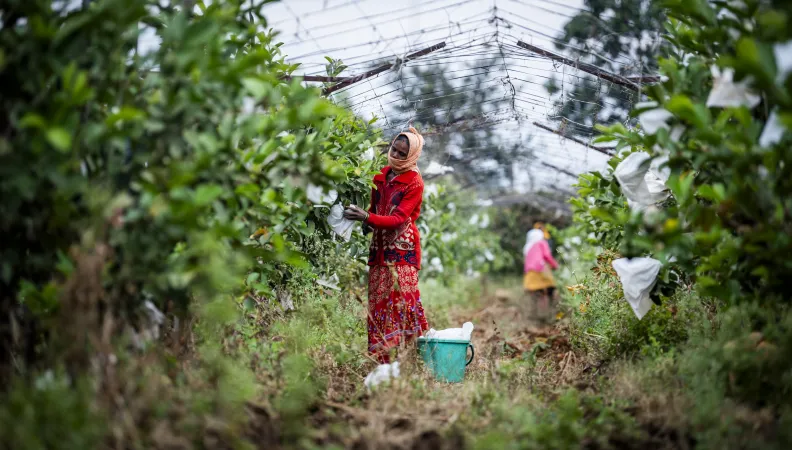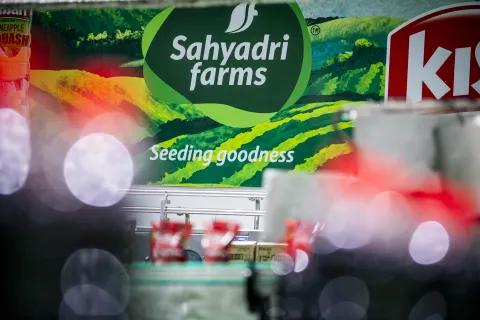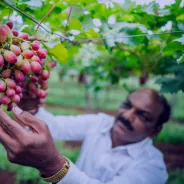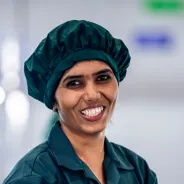Share the page
Sahyadri Farms, vines are a joint initiative
Published on

In the Indian state of Maharashtra, the Sahyadri Farms (a farmer collective owned company) – supported by Proparco – has managed to build a network of 24,000 smallholder farmers and become the country’s largest exporter of fresh grapes and other crops. Report.
Located in the rural district of Nashik – a five-hour drive from Mumbai, India’s economic hub – the headquarters of Sahyadri Farms is an impressive sight. With its “neat roads lined with flower beds”, as described by Le Figaro French newspaper which visited the site in late 2022, this campus employing more than 6,000 people, set amidst vineyards and fruit plantations, is an impressive site for visitors.

Less than 15 years ago, there was nothing around here but fields and a few cultivated patches. Then, in 2011, a handful of farmers – around ten initially – got together to create Sahyadri Farms, a big cooperative run solely by… smallholder producers.
A bold and winning strategy. Sahyadri Farms is currently India's biggest exporter of fresh grapes and processed fruit (such as tomatoes, mangoes, sweet corns and cashew nuts). Some 24,000 farmers - spread over 50 kilometres - supply Sahyadri Farms with fresh produce, while 8,500 are directly owned the organisation.
Less than 1 hectare
Over 95% of the farmers who work for Sahyadri Farms or are associated with the cooperative are smallholders growing less than one hectare of vines or other crops.
A complete ecosystem, from field to table
“Last year, we produced and processed more than 250,000 tonnes of fresh produce, in which 80% are for export market. We’re targeting 300,000 tonnes this yar", explains Santosh Watpade, the cooperative's Chief Financial Officer. Sahyadri Farms partners its farmers, from crop selection to farming practices, including the inputs they use and how they harvest and sell their produce.
The company is now fully tech enabled and integrated the value chain for 8 horticulture crop, from pre-harvest and post-harvest (i.e., sorting/packing/processing of fruit and vegetables), to distributing to consumers in both the Indian and international markets (B2B and B2C).
18% of GDP
India is the world's second largest agricultural producer. Agriculture employs over 40% of the working population and accounts for 18% of the country's gross domestic product.
Objective: zero net emissions
In 2022, Proparco co-invested in Sahyadri Farms, alongside Incofin Investment Management, FMO and Korys, for a total amount of 310 Crores of rupees (almost €40 million). "This investment will bolster our export markets for all of our crops and increase our capacity", explains Santosh Watpade.
The investment has also enabled the cooperative to finance its new biogas plant, with a capacity of 1.6 megawatts of electricity based on a process of fermentation of organic matter from agricultural sources. "Our aim with this new plant is to achieve carbon neutrality (i.e., zero net emissions)", adds Rupesh Khiste, Head of R&D and Projects at Sahyadri Farms.
“For a long time, enterprise in rural India - where 60% of the population lives - was non-existent. But over the last ten years or so, the situation has changed: attitudes are evolving and projects are proliferating although access to capital remains a major obstacle.”

For Sachin Kadam, union is strength
"Here, every voice counts." On the path down to his 12 hectares of vines, just below his house, Sachin Kadam is adamant: "One farmer, one vote. That's the principle behind the Sahyadri Farms project". This farmer, who specialises in growing fresh grapes, joined the cooperative few years ago. “All of the farmer-members together decided on the major focuses and strategic choices for guiding the future of the cooperative. That's what constitutes the strength of this project."

The benefits for his farm have been quite spectacular: Sachin has increased the areas under vines five-fold and now exports 80% of production to Asia and Europe. He has also benefited from technological progress that he could never have accessed on his own. "The agricultural expertise of Sahyadri Farms teams and their innovative approaches have revolutionised my practices," he readily admits. "Before, I had to battle the bad weather that was ravaging my crops.” Since then, Sachin has grown Thompson grapes - a hardier, seedless variety from California - upgraded his vines and received regular support from agricultural engineers.
This cooperative-based system means that the farmers involved in the venture - most of whom grow less than one hectare - receive regular, predictable incomes. This is vital, given that 80% of people living below the poverty line in India are small farmers. "The Sahyadri Farms project protects its members. We can estimate our income in advance, invest and even expand", explains Sachin, who recently had a new house built, as well as a greenhouse that allows him to dry some of his grapes and other crops (especially tomatoes).
Innovating to adapt to climate change
In the village of Kone – over an hour’s drive from the district of Nashik – Bashkar Vishnu Kamble, a member of Sahyadri Farms, grows almost 10 hectares of Thompson vines, a variety long renowned for its ability to cope with bad weather.
But with climate change - which in these latitudes takes the form of a violent rainy season and a scorching summer - Bashkar has to adapt. Landslides, floods, heatwaves, cyclones, droughts and dust storms... The Indian subcontinent is one of the world’s most disaster-prone regions. In an attempt to cope with these natural disasters and anticipate better crop yields, Bashkar has planted two hectares of a new red grape variety, ARD36.
"It's a crisp, sweet table grape that copes especially well with extreme weather conditions and is also very popular in export markets", explains Pankaj Nathe, who heads up the agronomic research team at Sahyadri Farms. At the heart of the Cooperative's campus, this agricultural engineer has developed this new-generation vine on around one hectare of land, as well as other red and white grape varieties, which he monitors like a saucepan that can boil over any time. "We test them here in real conditions. Every day, we track the development of the grapes and their resistance to rain, heatwaves, disease and so on. This is vital if we are to anticipate the effects of climate change and explore new markets."
To help with soil regeneration, Bashkar will also be planting hedges at Kone.
“Rising temperatures are disrupting climate conditions and upsetting the natural balance", notes the farmer. "We all need to do our bit.”

Rohini Satish: "Thanks to Sahyadri Farms, I was able to emerge from unemployment and isolation”
At the entrance to a vast industrial building right in the heart of the Sahyadri Farms campus, Rohini Satish notes the weight of the baskets that her colleagues are dropping off by turn. Each basket contains between 3 and 5 kilos of cashew nuts, meticulously sorted by hand, and from which the largest specimens - destined for export or upmarket stores in Delhi and Mumbai - have been selected.
"I'm both proud and happy to do this job", smiles this young mother of two from a village in the Nashik district. "It's almost impossible for an Indian woman to find a stable job in a rural area. Sahyadri Farms has enabled me to emerge from unemployment and isolation".

Given that the female employment rate in India is estimated at less than 10%*, according to the Center for Monitoring the Indian Economy (CMIE) – one of the world’s lowest – Rohini really appreciates how lucky she is. "Without this job, which I've had for three years, my life would be very difficult", she stresses. "I wouldn't be able to bring up my children, let alone help my parents".
This view is shared by Dhanashri Shrirang who supervises the workshop, which employs over 300 people, all of them women. "Working here is a great opportunity", she realises, acknowledging the difficulty Indian women have in finding regular employment. "I also feel safe both inside and outside the factory, because every day a bus takes us back home. That's really important.”
*The employment situation of Indian women has deteriorated with the Covid-19 pandemic: According to Le Monde daily newspaper, between 2017 and 2022, 21 million women had to leave their jobs (in the formal sector).
key figures
- No.1 exporter of fresh grapes in India
- 24,000 smallholders, 8,500 of which are shareholders
